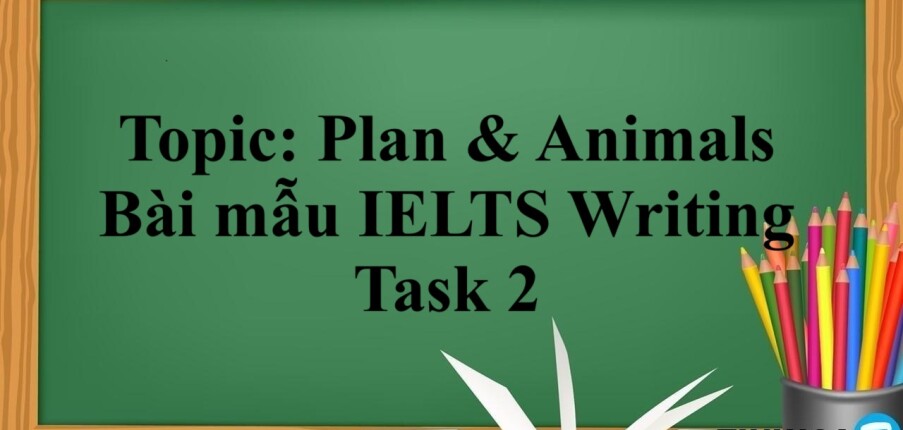DOL sẽ trình bày quan điểm qua 1 đoạn mở bài (introduction), 2 đoạn thân bài (body paragraph), và 1 đoạn kết bài (conclusion).
Mở bài: Sau khi paraphrase lại đề bài, DOL sẽ đưa ra một Thesis Statement (luận điểm) để nêu quan điểm.
- Body 1: DOL phân tích lý do một vài người cho rằng không cần can thiệp vào sự tuyệt chủng của một số loài.
- Body 2: DOL phân tích lý do cho quan điểm của mình: con người nên ngăn cản sự tuyệt chủng của một số loài.
Kết bài: DOL kết luận và khẳng định lại quan điểm của mình.
Bài mẫu IELTS Writing Task 2
Bài mẫu band 5.5+
With an increasing number of animals enlisted in protection catalogues, there has been a dissent that extinction is a natural process with which people should not interfere. In my view, the opinion overemphasises the importance of Darwinism so that overlooks people's determination to preserve themselves by protecting endangered animals.
Although the passage endeavours to defend people's efforts to prevent extinction, the supporters of Darwinism are also with some reasons. For illustration, they are reasonable in claiming that if people disproportionately intervene in natural progress, consequences are usually beyond control. One compelling example is seen in Australia, where the scientists once contrived to save land parrots from extinction by introducing foxes as the natural enemies of rats, which ate land parrots' eggs. However, contrary to the original expectation, the foxes introduced found land parrots were better prey, which worsened the situation of land parrots and consequently accelerated the extinction of the species. In light of this, it seems plausible to claim that people's efforts will only exacerbate situations, and they ought to be satisfied with the role of observers.
However, this perspective to a large degree neglects people's determination to refuse tamely submit their future to nature. The modern society is highly dependent on bio-products, food, medicine, or textile. For example, it is inconceivable to produce fruits without bees, and therefore if humans allow natural selection to exterminate bees, if humans show "respect" for Darwinism, it is not different from committing suicide. In light of this, the passage is inclined to view the human's endeavours to prevent extinction as an effort to take control of our own future, which actually is what humans have done across millions, using the brain to emerge from nature.
In summary, the passage can understand the apprehension of the supporters of Darwinism, as there are some examples of people's intervention in natural selection brought undesirable consequences. Despite this, if we forsake these efforts, it equals to submit ourselves totally to nature's control, which is more undesirable, and therefore the human had better continue to explore along the road of stopping extinction.
Bài mẫu band 6+
Earth's history has witnessed a multitude of animal species existing and becoming extinct, rendering this process seemingly ordinary and fostering the notion that human intervention is futile. However, I contend that the endeavors to preserve biodiversity is essential and justified.
Admittedly, extinction is an intrinsic part of nature's evolutionary process. Firstly, in an ever-changing world, it is logical that species deficient in adaptive capabilities would inevitably confront the risk of eradication. For example, inhabiting predator-free islands, flightless dodo birds lacked defense against human invaders and eventually underwent extinction. Furthermore, the disappearance of certain species can pave the way for the rise of others. The demise of the dinosaurs, for instance, created ecological niches that allowed mammals to flourish, culminating in the emergence of humans.
Nevertheless, there are compelling reasons why preventing species extinction is within human responsibility. To begin with, the recent disappearance of numerous species is not purely a natural phenomenon, but rather often driven by anthropogenic activities. Habitat destruction resulting from deforestation and urbanization, coupled with excessive hunting unequivocally compromises the continued existence and proliferation of diverse fauna. Also, the extinction of one animal might invoke a chain reaction that potentially lead to the collapse of the entire ecology system, ultimately jeopardizing human survival and development. This might be explained by the fact that ecological services derived from nature encompass the most basic human needs, such as food, fuel, clean water, materials and medicines.
In conclusion, although the extinction of one species aligns with the laws of nature, human efforts to protect wildlife and ecosystems are of great significance. The current biodiversity loss not only threatens our own well-being but is largely attributed to human activities, underscoring our responsibility to mitigate this crisis.
Bài mẫu band 6.5+
The extinction of species is often regarded as a natural evolutionary process, leading some to argue that human intervention to prevent it is unwarranted. I strongly disagree with this perspective, as there are compelling reasons to protect endangered species, notwithstanding the arguments rooted in natural selection and adaption.
Admittedly, the elimination of certain species can indeed be attributed to natural evolutionary processes and biological self-adjustment. Species, such as dinosaurs that once thrived on Earth, died out as they failed to survive the apocalypse of asteroid impacts, then paving the way for the rise of other life forms, like mammals and, eventually, humans. This natural shift shows that the extinction of species is uncontrollable and irreversible. Additionally, biological self-adjustment proves that species whose propensity fails to keep up with fast-changing environmental conditions end up vanishing. Dodos, for example, were wiped out in the late 17th century due in part to their inability to escape predators(mostly humans) and their vulnerable population size.
However, the arguments aforementioned overlook one important factor: whether there is human intervention. Most extinctions nowadays are caused by human activities, such as pollution, deforestation, and intensive farming, so we have every reason to protect animals from annihilation.One is the maintenance of biodiversity. Each species plays a unique role within its ecosystem, and their loss can trigger negatively cascading effects on other species. For example, bees have the critical role in pollination. If these industrious creatures were to be extinct, a large portion of plant species that reply on them would also die out, thus collapsing those herbivorous animals feeding on these plants, and in turn, carnivorous animals that feed on the herbivores. Another reason is the responsibility we should take for future generations. By preserving animals and their habitats, we ensure that our children and grandchildren can benefit from the abundant flora and fauna and all the resources they provide. This ethical duty compels us to mitigate the impacts of human activities and preserve the biodiversity for generations to come.
In summation, the preservation of endangered species is a testament to our reverence for life and our commitment to the future. As stewards of this planet, we are custodians of its biodiversity, and our actions today will echo through the annals of time. Let us not be the generation that idly watches as the tapestry of life unravels, but rather the one that weaves it tighter with threads of conservation and respect. For in the end, the measure of our humanity is not in what we destroy but in what we protect and preserve for the generations yet to come.
Bài mẫu band 8+
It is well documented, that throughout the history of not only mankind but the whole planet Earth, many species were gone forever: from dinosaurs millions of years ago to dodos just a couple of centuries earlier. Some say, that extinction is impossible to avoid and globally there is nothing humans can do about it. While it may be true to some degree, there are still a plethora of reasons why people should consider preventing it from happening.
To begin with, it is crucial to differentiate the reasons for extinction, as juxtaposing dinosaurs and dodos is completely wrong: the former were inevitably killed as a result of a meteor collision with the Earth, and the latter were exterminated as a result of humans activities, mainly poaching. Consequently, human behaviour can be controlled and the negative consequences they inflict can be negated.
However, why should we care about endangered animals at all? Firstly, it is extremely important to sustain animal diversity not only for the sake of morality but also to preserve a healthy ecosystem of our planet. Deteriorating biodiversity has a detrimental effect on our surroundings, as each animal species represents a small gear in a big system, and when destroyed, it causes a chain reaction, affecting other elements. Furthermore, if humanity continues to act recklessly towards other species it can create an endless cycle of extinction, eventually leading to self-destruction.
In conclusion, although I firmly believe, that in some cases animals die out of natural causes, humans can still control their actions and minimize the impact they have on the environment. The conservation of endangered animals is a small part that can greatly affect our world in various ways.
Vocabulary
- a futile endeavor /ə ˈfjuːtaɪl ɪnˈdɛvə/: một nỗ lực vô ích
- non-intervention /ˌnɒnɪntəˈvɛnʃᵊn/: không can thiệp
- an inherent part of the evolutionary cycle /ən ɪnˈhɛrᵊnt pɑːt ɒv ði ˌiːvəˈluːʃᵊnᵊri ˈsaɪkᵊl/: một phần vốn có của chu kỳ tiến hóa
- face natural selection pressure /feɪst ˈnæʧᵊrᵊl sɪˈlɛkʃᵊn ˈprɛʃəz/: đối mặt với áp lực chọn lọc tự nhiên
- the Earth's ecological processes /ði ɜːθs ˌiːkəˈlɒʤɪkᵊl ˈprəʊsɛsɪz/: các quá trình sinh thái của Trái đất
- interfere with the natural order of the planet /ˌɪntəˈfɪəz wɪð ðə ˈnæʧᵊrᵊl ˈɔːdər ɒv ðə ˈplænɪt/: can thiệp vào trật tự tự nhiên của hành tinh
- demand exorbitant expenses /dɪˈmɑːndɪŋ ɪɡˈzɔːbɪtᵊnt ɪkˈspɛnsɪz/: đòi hỏi chi phí cao
- allocate to /ˈæləʊkeɪtɪd tuː/: phân bổ cho
- pressing issue /ˈprɛsɪŋ ˈɪʃuːz/: vấn đề cấp bách
- to address the issue /tuː əˈdrɛs ði ˈɪʃuː/: giải quyết vấn đề
- endangered species /ɪnˈdeɪnʤəd ˈspiːʃiːz/: loài có nguy cơ tuyệt chủng
- accelerate /əkˈsɛləreɪtɪd/: thúc đẩy
- a domino effect /ə ˈdɒmɪnəʊ ɪˈfɛkt/: hiệu ứng domino
- conscious stewards /ˈkɒnʃəs ˈstjuːədz/: những người quản lý có ý thức
- mitigate the impact /ˈmɪtɪɡeɪt ði ˈɪmpækts/: giảm thiểu tác động
Lời kết
"It is a natural process which animal species such as dinosaurs become extinct. There is no reason for people to prevent this from happening. Do you agree or disagree?", 1900 mong các bạn không chỉ nắm được cách trả lời hiệu quả cho một bài Writing task 2 dạng Agree or Disagree mà còn có thể bỏ túi được một vài từ vựng, cấu trúc hay của chủ đề Plan & Animals nhé.
Xem thêm các tài liệu Tiếng Anh hay, chi tiết khác:
TOP Việc làm "HOT" dành cho sinh viên:




